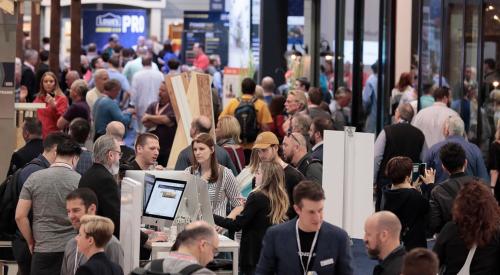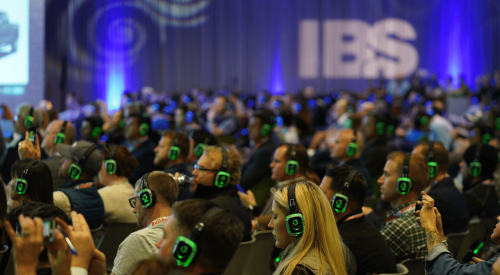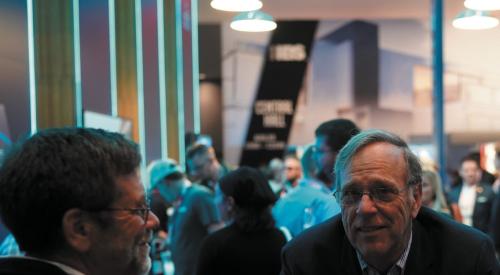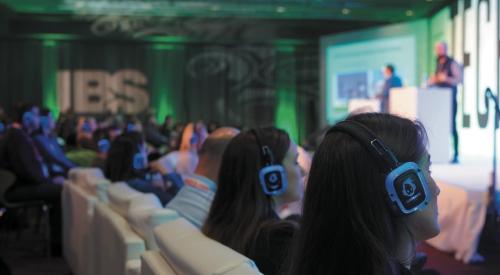The 2018 International Builders’ Show (IBS) marks my 27th consecutive year of attendance. My total investment in IBS over those years works out to be about 27 weeks of time and well over $100,000 in costs. Has IBS attendance been worth all this time and money? Honestly, sometimes it has, and sometimes it has not. But that’s my fault, because the return on investment was up to me and my preparation, and as is the case in almost all aspects of home building, the devil is in the details.
IBS has more education, products, displays, networking opportunities, and events than any person could hope to digest in a three-day visit. Going to IBS without a plan and goals would be the equivalent of trying to build a house without blueprints or specifications. To help you maximize your IBS ROI, I am going to share my top 16 secrets that I learned over the past two decades of attendance.
Your top goal for attending IBS has to be to learn. When I began my home building career, I wanted to earn more money. My goal was simply to triple my income. To pursue this lofty goal, I became a new home salesperson. Success was not immediate—it took three months of intense education, practice, and work before I began to make progress. The first lesson I learned in home building was that earning only comes before learning in the dictionary. In other words, if you want to earn more money or be successful, first you have to grow your knowledge and skill base. This is as true today as it was 30 years ago, and IBS can be instrumental in that pursuit.
Two other goals should be to look for processes and thought leaders that challenge the way you currently operate. Don’t make the mistake of only looking for the things that reaffirm what you are already doing. And finally, despite what Curly said in the movie “City Slickers,” your IBS ROI will not likely be based upon “one big thing,” but actually on a lot of little discoveries, so keep a list of these little things that can add up big over time. Now, here are the secrets.
What to Do Before You Go to the International Builders' Show
1. Set specific objectives (e.g., research new specifications, explore new products, learn about customer service and sales training options, etc.). All staff members going to the show must have several preplanned goals. An “I’ll figure it out when I get there” attitude is less productive than committing to specific activities. Also, keep in mind that many staffers would prefer a week of education, growth, and learning at IBS over a salary increase. This can work out as a win-win-win for the staff and the company, and ultimately provide better service to your homeowners. Never underestimate the value of taking a promising staff person to IBS. I can’t tell you how many staffers excitedly left IBS with a new appreciation for the industry and an incredible sense of scale (suddenly 45 homes a year wasn’t that many after all).
2. Create daily plans for each of the three IBS days from 7 a.m. until 9 p.m. Remember, this isn’t a vacation, it’s some of the hardest work of the year. If you want to add a few days before or after IBS for vacation time, do, but maximize the three IBS days to their fullest extent. Also, be sure to leave an out-of-office voicemail and email, so you do not have to deal with fires back home while you’re away. Oddly enough, many of these fires somehow find a way to extinguish themselves by the time you return four to five days later. 
3. Review all IBS Educational Programs and pick a first, second, and third choice for each slot. If choice No. 1 doesn’t pan out or is full, then immediately head for choice No. 2. For critical No. 1-rated sessions arrive at least 20 minutes early. Most rooms have strictly enforced capacity limits and I have seen 100-plus frustrated attendees standing outside their desired program. I am estimating that IBS attendance will be up 10 to 20 percent this year, but the educational programs were only increased by a fraction, so room capacity will likely be an even bigger challenge at IBS 2018.
4. Research networking groups prior to the show, such as Builder Partnerships and software user groups. Many have meeting at IBS and are a great way to both leverage your IBS investment and expand your networking opportunities.
5. Fill in the holes in your Educational Program list by exploring the exhibitors space or arranging one-on-one meetings with fellow builders, consultants, manufacturers, etc. Some builders report the best sessions were held on the exhibit floor. These sessions were informal and allowed for more questions. Invest some time reviewing those offerings and selecting any that resonate.
What to Do While You're at IBS
6. Meet each morning with your team at 7 a.m. and discuss your daily plans. If you are attending with others split up educational sessions so as to maximize coverage. Have everyone keep notes/handouts and share the information. If you are not taking other staff members, then arrange to meet each morning with an industry peer to compare notes.
7. Download each evening with your team at 5:30 p.m. to share findings and adjust the following day’s plan. Say for example a purchasing manager made a great contact with a window manufacturer that may be a perfect solution to one of the pre-show objectives. Adjusting your educational program list to meet with a vice president of national sales may be a better option to enhance your overall IBS ROI.
8. Complete the educational program surveys. The program selectors want to give the attendee’s evaluations their due weight in selecting future programs. Top programs and speakers should be rated highly and vice versa. Also, if the session is especially good, make a point to walk up to a speaker and introduce yourself and exchange business cards. Many speakers at the Builders’ Show are on their own nickel as a means to give back to the industry. They may be interested in sharing more of their knowledge with you.
9. Tour the Exhibitors space with a plan. Walking around aimlessly leads to impulse discussions that burn your valuable goals/objectives time. The Exhibitors space can justify the IBS investment alone by offering new product information, installation solutions, etc. Many of the manufacturers’ booths also have their designers, engineers, technology staff, and executives in attendance, too. If you are having challenges with anything from creaks to leaks—the answer is out there. And, if you are really on top of your game, then pre-schedule meetings with these Exhibitors weeks in advance, and confirm meeting location, time, and topics.
10. Eat a big breakfast—and take a snack for lunch. Long lines, lack of seating, and difficulty in coordinating lunch schedules can be a major time killer and pain. And, speaking of pain, it would be a good idea to take some ibuprofen along, too.
11. Wear comfortable shoes. You won’t believe how many miles you will walk (I estimate at least 5 miles per day).
 12. Distribute and collect 25 business cards. Exchange cards with fellow builders, consultants, and exhibitors. Do not rely on the exhibitors space booth card scanning system. Sometimes, the information you need arrives months later, or is not specific to your request. A lot of the exhibitors get overwhelmed with booth visitors and cannot distinguish the urgent needs from the general information inquiries. If you exchange business cards, then you can follow up as your need requires.
12. Distribute and collect 25 business cards. Exchange cards with fellow builders, consultants, and exhibitors. Do not rely on the exhibitors space booth card scanning system. Sometimes, the information you need arrives months later, or is not specific to your request. A lot of the exhibitors get overwhelmed with booth visitors and cannot distinguish the urgent needs from the general information inquiries. If you exchange business cards, then you can follow up as your need requires.
13. Visit the NAHB bookstore. It is a repository of hundreds of specific books on topics from land planning to customer service and everything in between. The bookstore offers you the opportunity to review the books before purchasing. Many of the Builders’ Show educational session speakers are also authors and have their books in the bookstore, for a deeper educational dive into their areas of expertise.
14. Be sure to check for pre- or post-IBS educational programs. There may be other opportunities for learning while you are in town.
15. Visit the IBS show homes, including the ones at Professional Builder’s Show Village outside the convention center and The New American Home, which is offsite.
What to Do After IBS
16. Teach others. When you (and other staff) return from IBS, organize your notes and handouts and prepare a group presentation of findings and outcomes with your office staff, salespeople, superintendents, trade partners, bankers, etc. The more you teach what  you learned the deeper it becomes ingrained in your own learning, not to mention increasing your ROI by sharing this newfound knowledge.
you learned the deeper it becomes ingrained in your own learning, not to mention increasing your ROI by sharing this newfound knowledge.
To the best of my math reckoning, I believe the IBS time and $100,000 investment has produced well over $10 million in net profits. That’s a hundred-fold ROI and illustrates the value of IBS, and what can be gained if attendance is maximized.
International Builders' Show: 10 Don'ts
1. Don’t go to IBS for half-days. IBS is clearly a full-time job.
2. Don’t meet your local trade partners at IBS. You can do that at home.
3. Don’t bring your office work to IBS. The show is an important investment in growing your knowledge. Returning emails is a misuse of your personal investment. Even checking in with the office can lead to hours of IBS disruption.
4. Don’t stay out late or have bad health habits. Be well rested. Every day at IBS is game day.
5. Don’t stay in an educational session that isn’t teaching you anything. If it doesn’t meet your expectations, move on. Sometimes a program doesn’t match the description, which is why you preselected some backups.
6. Don’t forget to fill out the educational session evaluations. And if a home builder is a speaker, the session should get bonus points. Learning from fellow builders was invaluable in my IBS learning.
7. Don’t neglect your routine. Build into the plan your normal hours of sleep and exercise.
8. Don’t develop conference guide tunnel vision. There are many learning opportunities in the education sessions, exhibitors space, and networking. Have a plan for all three.
9. Don’t count on the Exhibitor space scanning system. For important information or networking, exchange business cards.
10. Don’t forget to call home. Behind every successful person is a supportive family and home life.













